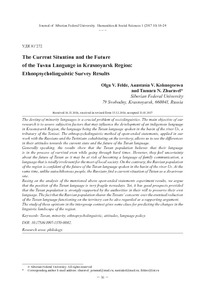Показать сокращенную информацию
The Current Situation and the Future of the Tuvan Language in Krasnoyarsk Region: Ethnopsycholinguistic Survey Results
| Автор | Felde, Olga V. | en |
| Автор | Kolmogorova, Anastasia V. | en |
| Автор | Zhuravel, Tamara N. | en |
| Автор | Фельде, О.В. | ru_RU |
| Автор | Колмогорова, А.В. | ru_RU |
| Автор | Журавель, Т.Н. | ru_RU |
| Дата внесения | 2017-01-27T08:12:44Z | |
| Дата, когда ресурс стал доступен | 2017-01-27T08:12:44Z | |
| Дата публикации | 2017-01 | |
| URI (для ссылок/цитирований) | https://elib.sfu-kras.ru/handle/2311/30754 | |
| Аннотация | The destiny of minority languages is a crucial problem of sociolinguistics. The main objective of our research is to assess subjective factors that may influence the development of an indigenous language in Krasnoyarsk Region, the language being the Tuvan language spoken in the basin of the river Us, a tributary of the Yenisei. The ethnopsycholinguistic method of open-ended statements, applied in our work with the Russians and the Tuvinians cohabitating on the territory, allows us to see the differences in their attitudes towards the current state and the future of the Tuvan language. Generally speaking, the results show that the Tuvan population believes that their language is in the process of survival even while going through hard times. However, they feel uncertainty about the future of Tuvan as it may be at risk of becoming a language of family communication, a language that is totally irrelevant for the most of local society. On the contrary, the Russian population of the region is confident of the future of the Tuvan language spoken in the basin of the river Us. At the same time, unlike autochthonous people, the Russians find a current situation of Tuvan as a disastrous one. Basing on the analysis of the mentioned above open-ended statements experiment results, we argue that the position of the Tuvan language is very fragile nowadays. Yet, it has good prospects provided that the Tuvan population is strongly supported by the authorities in their will to preserve their own language. The fact that the Russian population shares the Tuvans’ concerns over the eventual reduction of the Tuvan language functioning on the territory can be also regarded as a supporting argument. The study of these opinions in the intergroup context gives some clues for predicting the changes in the linguistic landscape of the region | en |
| Аннотация | В статье рассматривается проблема витальности миноритарного тувинского языка, функционирующего в условиях тесного контакта с русским. Анализ субъективной оценки жизнеспособности тувинского языка дается на материале психолингвистического эксперимента, который был проведен в населенных пунктах Усинской котловины Красноярского края | ru_RU |
| Язык | en | en |
| Издатель | Сибирский федеральный университет. Siberian Federal University | en |
| Тема | Tuvan | en |
| Тема | minority | en |
| Тема | ethnopsycholinguistic | en |
| Тема | attitudes | en |
| Тема | language policy | en |
| Тема | миноритарный язык | ru_RU |
| Тема | мажоритарный язык | ru_RU |
| Тема | витальность | ru_RU |
| Тема | языковая ситуация | ru_RU |
| Тема | языковая политика | ru_RU |
| Тема | языковой сдвиг | ru_RU |
| Тема | психолингвистический эксперимент | ru_RU |
| Название | The Current Situation and the Future of the Tuvan Language in Krasnoyarsk Region: Ethnopsycholinguistic Survey Results | en |
| Альтернативное название | Настоящее и будущее тувинского языка в Красноярском крае: анализ результатов этнопсихолингвистического эксперимента | ru_RU |
| Тип | Journal Article | |
| Тип | Published Journal Article | |
| Контакты автора | Felde, Olga V.: Siberian Federal University 79 Svobodny, Krasnoyarsk, 660041, Russia; feldeo@list.ru | ru_RU |
| Контакты автора | Kolmogorova, Anastasia V.: Siberian Federal University 79 Svobodny, Krasnoyarsk, 660041, Russia; nastiakol@mail.ru | en |
| Контакты автора | Zhuravel, Tamara N.: Siberian Federal University 79 Svobodny, Krasnoyarsk, 660041, Russia; zhuravel_petamal@mail.ru | en |
| Контакты автора | Фельде, О.В.: Сибирский федеральный университет Россия, 660041, Красноярск, пр. Свободный, 79 | en |
| Контакты автора | Колмогорова, А.В.: Сибирский федеральный университет Россия, 660041, Красноярск, пр. Свободный, 79 | ru_RU |
| Контакты автора | Журавель, Т.Н.: Сибирский федеральный университет Россия, 660041, Красноярск, пр. Свободный, 79 | ru_RU |
| Страницы | 16-24 | |
| Журнал | Журнал Сибирского федерального университета. Гуманитарные науки. Journal of Siberian Federal University. Humanities & Social Sciences;2017 10 (1) | en |

